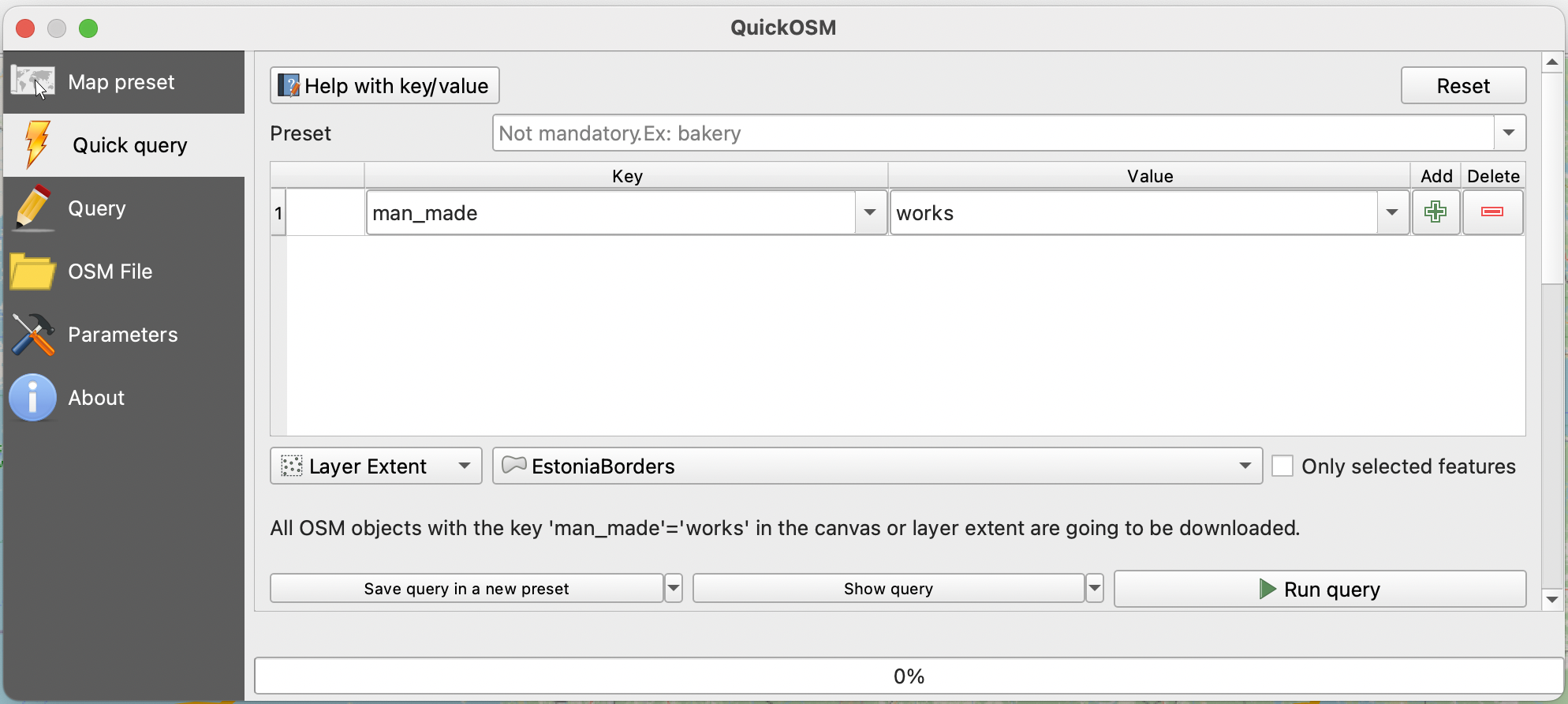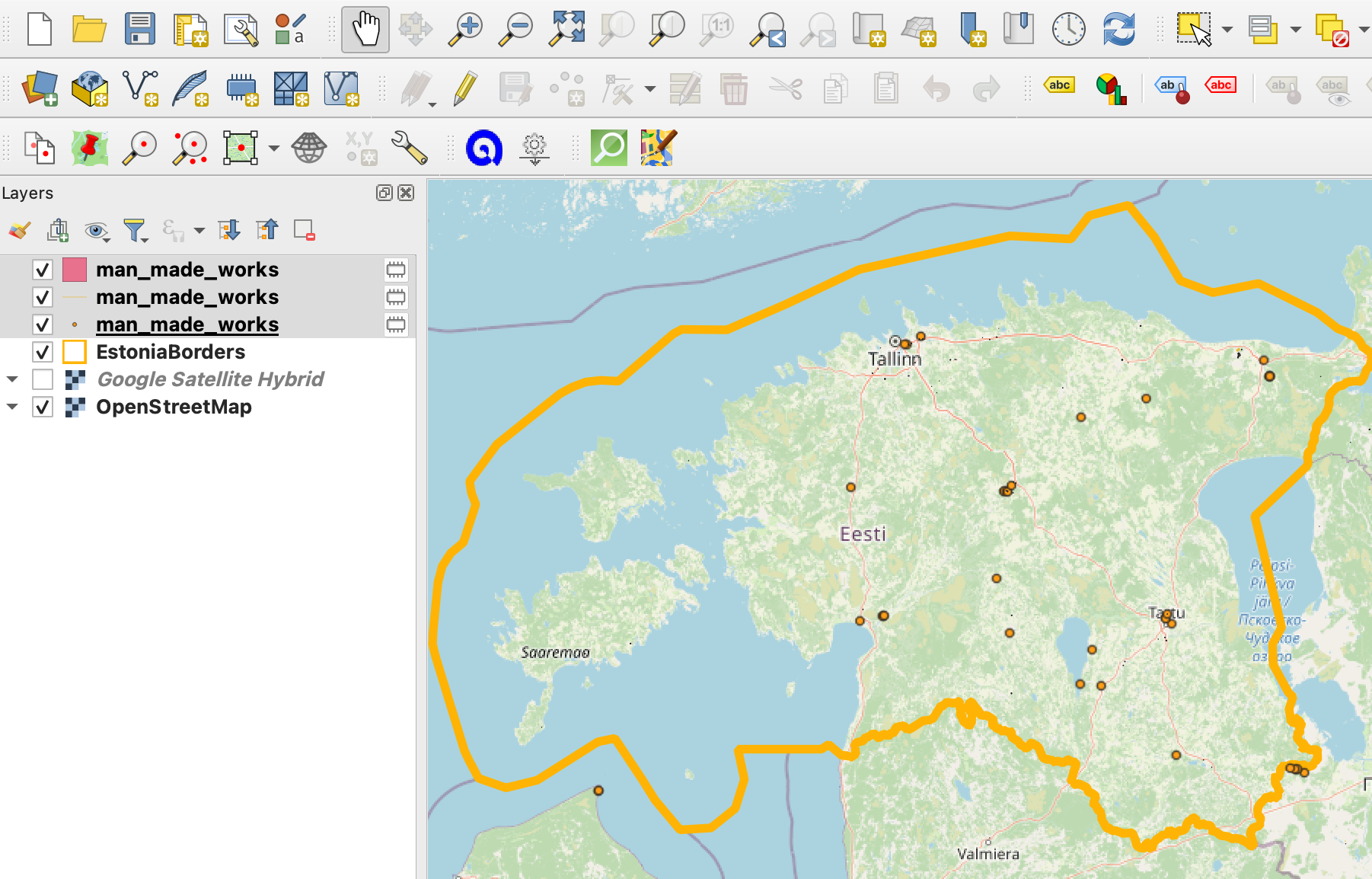I would like to have all objects from OpenStreetMap with the Tag:man_made=works (ie factories), in Estonia. I can do this using QGIS, but another method using GeoFabrik's OSM extract fails.
QGIS way
I download Estonia's borders from osm-boundaries.com. I add it as a QGIS layer. Then I set up a query using the QuickOSM plugin (Overpass API endpoint set as: https://lz4.overpass-api.de/api/, Nominatim API endpoint set as: https://nominatim.qgis.org/search?):
After Run query, I get several factories.
I can export these to GeoJSONs.
OSM extract from GeoFabrik
I am trying to achieve the same thing via another way. I download estonia-latest.osm.bz2 from http://download.geofabrik.de/europe/estonia.html:
curl https://download.geofabrik.de/europe/estonia-latest.osm.bz2 -o estonia-latest.osm.bz2
Uncompress file:
bzip2 -dk estonia-latest.osm.bz2 # produces estonia-latest.osm
As suggested by this answer as well, estonia-latest.osm has:
points
lines
multilinestrings
multipolygons
other_relations
(I know this by running: ogrinfo estonia-latest.osm | tail -n +3 | awk '{print $2}')
Let's attempt to extract all man_made=works! I do:
for each in $(ogrinfo estonia-latest.osm | tail -n +3 | awk '{print $2}'); do
rm -f factories_${each}.geojson
echo ogr2ogr -f GeoJSON factories_${each}.geojson estonia-latest.osm $each -where "other_tags LIKE '%\"man_made\"=>\"works\"%'"
# this line above^ is to check what ogr2ogr command is running
ogr2ogr -f GeoJSON factories_${each}.geojson estonia-latest.osm $each -where "other_tags LIKE '%\"man_made\"=>\"works\"%'"
done
Output:
ogr2ogr -f GeoJSON factories_points.geojson estonia-latest.osm points -where other_tags LIKE '%"man_made"=>"works"%'
0...10...20...30...40...50...60...70...80...90...100 - done.
ogr2ogr -f GeoJSON factories_lines.geojson estonia-latest.osm lines -where other_tags LIKE '%"man_made"=>"works"%'
0...10...20...30...40...50...60...70...80...90...100 - done.
ogr2ogr -f GeoJSON factories_multilinestrings.geojson estonia-latest.osm multilinestrings -where other_tags LIKE '%"man_made"=>"works"%'
0...10...20...30...40...50...60...70...80...90...100 - done.
ogr2ogr -f GeoJSON factories_multipolygons.geojson estonia-latest.osm multipolygons -where other_tags LIKE '%"man_made"=>"works"%'
0...10...20...30...40...50...60...70...80...90...100 - done.
ogr2ogr -f GeoJSON factories_other_relations.geojson estonia-latest.osm other_relations -where other_tags LIKE '%"man_made"=>"works"%'
0...10...20...30...40...50...60...70...80...90...100 - done.
Problem: all the files created (factories_points.geojson, factories_lines.geojson, factories_multilinestrings.geojson, factories_multipolygons.geojson, factories_other_relations.geojson) are empty.
If I replace the where clause by "other_tags LIKE '%\"power\"=>\"substation\"%'", I do indeed get many electrical substations.
The query for factories might be wrong. GeoFabrik's OSM extract might not contain the factories I am looking for. Or something else.


